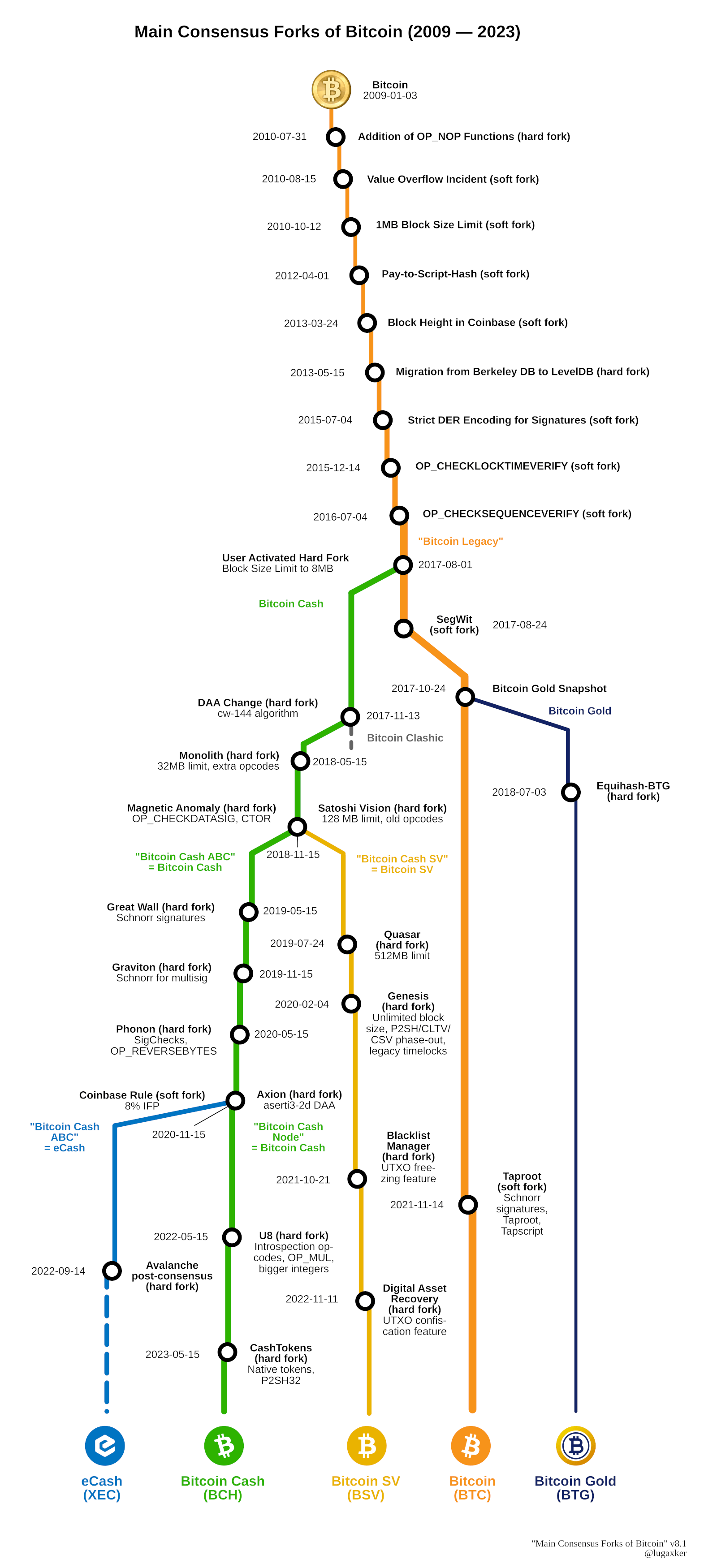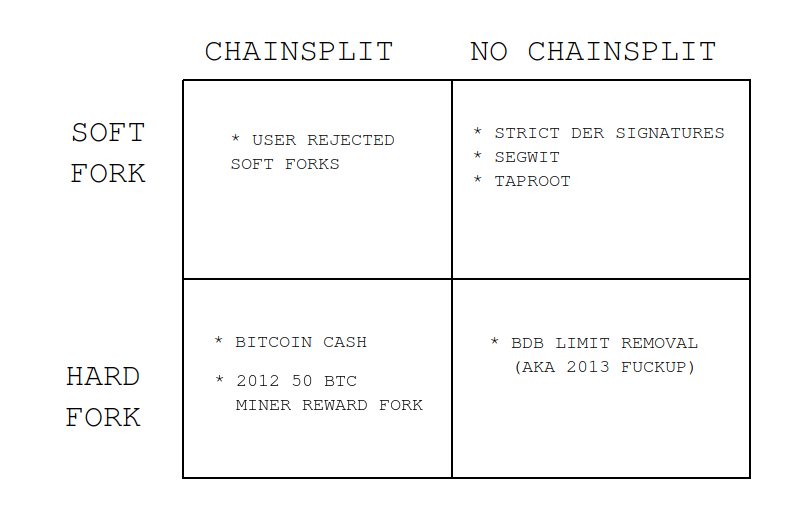What is a soft/hard fork?

Diagram of Bitcoin forks & splits to June 2023. Note that Bitcoin underwent both hard & soft forks before its initial chain split to BTC/BCH. Diagram is periodically updated by Reddit user lugaxker.
A hard fork is NOT a chain-split. This is a VERY common misconception (or piece of propaganda). The difference is explained below.
New entrants to cryptocurrency are often confused & bamboozled by terminology around soft/hard forks. As a finnicky, technical topic specific to cryptocurrency it is very common for the exact nuances to be misunderstood. A large part of the confusion is that a third phenomon, called a "chain split" is often erroneously conflated with a hard fork.
It is essential to understand a chain split before clarifying soft vs hard forks (and repository forks).
Chain split
A "chain split" is when a fork (either a hard-fork OR a soft-fork) causes a single blockchain to split into two separate coins. Most famously, this occured in The Blocksize War between BTC & BCH, but it also happened when BCH split again in the BCH/BSV split in late 2018 and also the BCH/XEC split in late 2020. Splitting is not unique to Bitcoin - it can happen on any blockchain, as with the ETH/ETC split - but there are no notable splits outside of those cases. Only Bitcoin & Ethereum have historically had sufficiently sized communities to mean a disputing minority is significant enough to create & sustain the conditions for two indepent coins to emerge from one.

A nice diagram illustrating how both soft & hard forks CAN lead to chain splits, but neither HAS to. A chain split is not directly related to a soft or hard fork.Source @oomahq
The determining factor in whether a (hard or soft) fork causes a split is not the fork itself, it is whether there is enough community controversy/contention for a substantial minority to protest the proposed changes. The reason for a chain-split is social, not technical. If there is sufficient disagreement before an upcoming fork, one or both camps within a single cryptocurrency may battle over control of the chain (with either one or both sides proposing a set of controversial desired changes). As a unique kind of non-violent, social consensus based warfare only possible in cryptocurrencies there is not a truly well-established set of norms governing these kinds of conflicts, however in general it is true that:
- The battleground is a combination of in-person conferences & meetups in addition to community debate online. Note that one or both sides may resort to underhanded tactics like censorship, propaganda. This political dispute may or may not escalate to direct economic/cryptographic warfare via (Bitcoin/Ethereum) miners. There are no current chain splits that have emerged from Proof of Stake.
- A dispute is going to be pretty serious & probably take at least 6 months and up to multiple years of civil conflict before eventuating in a split. Except for the ETH/ETC split, which due to its precipitating factor (timelocked coins) had to be resolved within a month, all the other Bitcoin splits were spurred by conflicts lasting from 9 months to 3 years in duration.
- The winning side of the conflict retains the brand name, icon & exchange ticker of the pre-split chain. This is an enormous victory because the network effect of branding, technical integrations & exchange-traded liquidity is incredibly powerful.
- The losing side of the conflict is forced into choosing a new name, icon & ticker symbol (starting from no exchange liquidity). Having to rebuild these assets/network effect from scratch is incredibly taxing to the losing side & leads to poor price performance of their coin relative to the winner (at least in the medium term).
- The aggreived losing side will almost certainly feel their project was hijacked & often set out to reclaim marketplace dominance over their former compatriots with a Flippening. This dynamic will likely lead to varying degrees of ongoing resentment on both sides of the conflict.
Hard forks
A hard-fork is a non-backwards compatible upgrade to a cryptocurrency. In other words, it can add, remove OR change consensus rules to the network of validating nodes.
A hard-fork may lead to a chain-split (creation of two coins), but it is not REQUIRED to. Hard forks & chain splits are related but separate concepts. A cryptocurrency can hard fork without splitting if there is no community contention.
The original Bitcoin hard-forked in 2010 & 2013 without causing a chainsplit.
The Bitcoin Cash community does a yearly hard fork network upgrade, co-ordinated through the CHIP Process. Since 2021 this has proceeded perfectly on a yearly schedule (May 2021, May 2022, May 2023... etc.) without any network disruption.
BTC Hard Fork Propaganda
BTC supporters are often opposed to doing hard forks. Part of the propaganda during the Blocksize War was to smear hard-forks as dangerous & risky (rather than a clean way to upgrade the network). This was one method to attack a blocksize increase as unsafe, by associating it with the dangerous sounding label "hard fork".
One argument was that if hardforks can be done to raise the blocksize, perhaps it could also be done to alter essential sound money properties of Bitcoin, such as by removing the 21 million coin limit or similar changes. This is of course total nonsense, for two reasons. First, a soft fork can be used to raise the 21 million limit just like a hard fork could be (just like SegWit increased the data in blocks without raising the blocksize), so avoiding hard forks is no protection against supply inflation. Second, the Bitcoin community had already performed hard forks for important upgrades before BCH/BTC split without any hint of anyone wanting to compromise the core aspects of Bitcoin prior to The Blocksize War & the BCH community has continued that since 2017.
As of January 2024, the idea of abandoning the 21 million coin limit has begun circulating in the BTC community. See this discussion on Episode 103. Once again, the irony could not be any thicker as the BTC community struggles with the issues they had slandered & erroneously predicted in the BCH community.
A suggestion is required to get enormous ecosystem traction before implementation & no-one in BCH wants to compromise the essential aspects of Bitcoin.
BTC supporters may have a belief that a hardfork is impossible without central co-ordination, but BCH does it regularly, so it's quite obviously possible. They are either unaware of this fact, or when questioned on it claim there must be a central co-ordinating entity in BCH but can tellingly never identify who or where that is.
Soft forks
A soft-fork is a backwards compatible upgrade to a cryptocurrency. In other words, it can add but NOT remove or change existing consensus rules to the network of validating nodes.
A soft-fork can cause a chainsplit if a substantial portion of the network decided to actively fight back or preserve the original non-upgraded rules. There aren't any high profile examples of this though, because The Blocksize War divided people into the SegWit soft-fork BTC & the 8 MB Bitcoin Cash big block hard-fork, with trivial to non-existent support for a 1 MB non-SegWit alternative. However it is possible to chainsplit against a softfork, for instance by checkpointing a block conforming only to the existing rules that the majority of miners (who had implemented the softfork) had rejected. Here is a Twitter thread discussing this scenario with Luke DashJr, the original inventor of the SegWit soft fork.
Just as with hard-forks, the BTC community largely have propaganda around this version of forks. They believe that soft-forks are superior (as unupgraded nodes will default to the same network as the upgraded nodes) because they claim it is "non-coercive" (i.e. no upgrade is required of existing nodes to stay on the network). This ignores the fact that a soft-fork can actually be MORE coercive, by bringing along existing nodes to an upgrade they were unaware of (for instance, the substantial change made by SegWit). With a hard-fork, not only is it easier to perform a technically clean upgrade but also nodes that are inactive will "protest"/reject the change by default. In contrast, for a soft-fork inactive users will comply by default which seems like an odd default to support if you're concerned about coercing users.
Software (Repository) forks
Confusingly, there is ONE other kind of fork. A "software fork" is when open source software, such as a Bitcoin node client, is copied in its entirety so that a new group of authors can change, update, maintain or preserve a copy of that software independent of the original owners. This is a natural & very common part of open source software development. Read more about it here.
A software fork of a Bitcoin client can lead to a soft fork or hard fork or a chainsplit (if the software forkers are intent on making consensus changes) - but it does not have to. Software forks may be done to change the user UI, translate the software to a new language or some other minor (non-consensus changing) reason. For instance, Bitcoin Knots is a software fork of the Bitcoin Core software on BTC, but as of June 2025 is only maintained for the purposes of allowing some user configuration of mempools.
It is also not required to have a software fork in order to have a soft fork or hard fork or chain split. Any of these can occur independently, e.g. a planned soft/hard fork may be coordinated by a dominant node client or an unplanned chainsplit by a node client bug (or the 1 or 2 block orphans that occur naturally as part of the random mining process). That said, software forks often overlap with persistent chain splits, because the dissenting minority prepared to fight for the coin will not want to start from scratch but instead form a new team of existing & new developers prepared to take the existing popular node client (or clients) software in a new direction. This is what happened with the BCH & BTC split.
A software fork is also often used for "altcoins". For instance, Litecoin was software forked from the Bitcoin client - but modified to start a fresh blockchain with slightly different properties instead of connecting to or splitting the existing Bitcoin blockchain. The Litecoin client thus shares some technical ancestry with the Bitcoin Core client, despite the blockchains themselves having no shared history (as BCH & BTC do).
See also: Why is there so much propaganda in BTC?